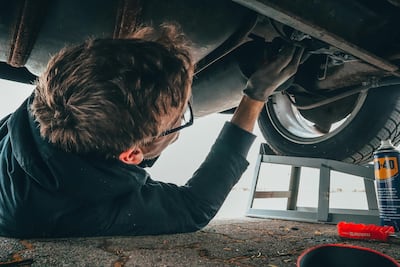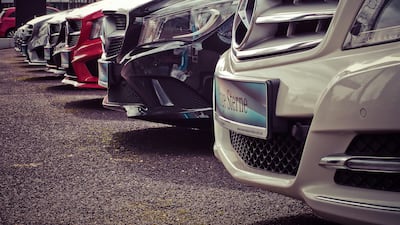The difference in price point between showroom-fresh and second-hand cars is significant. Yet, everyone has heard stories from friends and family about used-vehicle purchases that have ended in, at best, severe inconvenience and, at worst, complete disaster.
Don't let that put you off, however, as simply knowing the basic rules for buying a second-hand car can leave you confident in your purchase.
“Buyers are advised to closely examine the vehicle’s service history, mileage and overall condition – both mechanical and cosmetic,” says Karim Maksoud, managing director of Al Habtoor Motors, which deals in both new and used vehicles.
“It is equally important to verify that the car is free from any accident damage and has undergone a thorough, professional inspection,” Maksoud adds.
Dealer versus private owner
There are two options when looking for a used car – going through dealerships or sourcing a model directly from the previous owner.
In the main, you're likely to pay a little more to a dealership, but they invariably offer perks of one sort or another, and these can be highly attractive when it comes to having peace of mind when making your purchase.
Al Habtoor, for example, offers a 14-day exchange guarantee and a five-year top-up warranty, while Al Futtaim has roadside assistance and comprehensive inspections included with its Toyota and Lexus packages.
Carlos Montenegro, managing director of fleet strategy at Al Futtaim Automotive, another key player in the UAE used-car market, says transparency and trust are key, especially when buying from an individual owner.
“The most obvious red flags include inconsistent service history, signs of accident damage, unusually low pricing and unclear vehicle ownership or importation history,” he says.
Crunch the numbers
Once you find a car you fancy, one of the first things to do is track down its vehicle identification number.
VIN is a unique, 17-character alphanumeric code assigned to every car that will help ascertain its legitimacy.
The digits show the motor's country of origin, manufacturer, vehicle type and attributes, the year it was built and the plant in which it was assembled.
This code allows interested parties to assess the vehicle’s registration, insurance status and, crucially, any history of accidents or theft.
There are multiple online options for checking the VIN, the easiest being the websites for Emirates Vehicle Gate, Ministry of Interior, Dubai’s Roads and Traffic Authority, Abu Dhabi Police or Tamm.
When checking the code's validity, Maksoud says: “It is essential to verify that the VIN matches all official paperwork.”
Both Maksoud and Montenegro stress the relation between a car's mileage and its overall condition.
Distance-wise, figures suggest drivers average about 19,000-24,000km a year, so you can tell if a vehicle is above or below what you might expect by multiplying how old the car is by those digits.
Looks can matter
Looking for dents, scratches or rust is a given, but it's also worth thoroughly examining the panels up close to look for inconsistencies in paintwork.
These could be an indicator that the car has had a DIY patch-up after being scraped.
If the car is low to the floor, getting down on your back is not strictly necessary. Instead, run your fingers along the underside to see if there is any scratching not visible from an upright position.
It is, however, worth getting down on your hands and knees to check for any pools on the tarmac under the car while it is stationary, though – leaks of any kind are never a good sign.
Tyres are another area to check for wear and tear, with tread length being the key issue. You can test by inserting a Dh1 coin into the grooves at various points.
In general, if you can twist the coin, the tyre is worn and needs replacing.
Montenegro also recommends asking for certifications such as a 99-point or 145-point inspection, as these are often provided by dealers.
Cabin comforts
Inside the car, make sure you press every button there is to check each is doing what it's supposed to.
It’s also worth tapping the dashboard in a few places to ascertain that it’s still solid – things can become loose with age.
Also check the seating – it isn’t just about whether it’s comfortable or not, but also how worn the material is and whether it might need replacing.
Air conditioning is a key area of concern in this region, so start the engine and sit there for a few minutes to check all is in working order.
If the chilling isn’t thrilling, it could just be a case of topping up the refrigerant, but you should also look out for odd noises, such as squealing or rattling, and be cautious of mouldy smells.
Any aircon servicing outlet should be able to cure this, but you should consider how much you might have to spend when it comes to what you’re finally paying for the vehicle. You can get a refrigerant top-up for as little as Dh100, for example, but an overhaul will be significantly more.
In the driver's seat
Both experts agree that a test drive is essential. It’s difficult to assess problems from the engine's sound alone, but you should be able to tell if it sounds clunky or lacking in power.
All cars lose grunt as they age, but it's worth checking out the specs of a particular vehicle to give you an idea of what it was capable of when it was fresh off the production line.
Whole nine yards
All this aside, if you want to be really thorough, it’s worth seeking the services of a qualified mechanic to give the car a once-over.
A good technician will not only be able to assess any potential problems, but also tell you how much it might cost to put them right and what impact that will have on price negotiation.
Maksoud says: “After-sales support and credibility of the seller play a key role in a safe and satisfactory purchase.”
Montenegro concludes: “A well-maintained used car should come with a verified service history, low to moderate mileage relative to its age, and a clean body and interior.”
The smuggler
Eldarir had arrived at JFK in January 2020 with three suitcases, containing goods he valued at $300, when he was directed to a search area.
Officers found 41 gold artefacts among the bags, including amulets from a funerary set which prepared the deceased for the afterlife.
Also found was a cartouche of a Ptolemaic king on a relief that was originally part of a royal building or temple.
The largest single group of items found in Eldarir’s cases were 400 shabtis, or figurines.
Khouli conviction
Khouli smuggled items into the US by making false declarations to customs about the country of origin and value of the items.
According to Immigration and Customs Enforcement, he provided “false provenances which stated that [two] Egyptian antiquities were part of a collection assembled by Khouli's father in Israel in the 1960s” when in fact “Khouli acquired the Egyptian antiquities from other dealers”.
He was sentenced to one year of probation, six months of home confinement and 200 hours of community service in 2012 after admitting buying and smuggling Egyptian antiquities, including coffins, funerary boats and limestone figures.
For sale
A number of other items said to come from the collection of Ezeldeen Taha Eldarir are currently or recently for sale.
Their provenance is described in near identical terms as the British Museum shabti: bought from Salahaddin Sirmali, "authenticated and appraised" by Hossen Rashed, then imported to the US in 1948.
- An Egyptian Mummy mask dating from 700BC-30BC, is on offer for £11,807 ($15,275) online by a seller in Mexico
- A coffin lid dating back to 664BC-332BC was offered for sale by a Colorado-based art dealer, with a starting price of $65,000
- A shabti that was on sale through a Chicago-based coin dealer, dating from 1567BC-1085BC, is up for $1,950
ONCE UPON A TIME IN GAZA
Starring: Nader Abd Alhay, Majd Eid, Ramzi Maqdisi
Directors: Tarzan and Arab Nasser
Rating: 4.5/5
Dr Afridi's warning signs of digital addiction
Spending an excessive amount of time on the phone.
Neglecting personal, social, or academic responsibilities.
Losing interest in other activities or hobbies that were once enjoyed.
Having withdrawal symptoms like feeling anxious, restless, or upset when the technology is not available.
Experiencing sleep disturbances or changes in sleep patterns.
What are the guidelines?
Under 18 months: Avoid screen time altogether, except for video chatting with family.
Aged 18-24 months: If screens are introduced, it should be high-quality content watched with a caregiver to help the child understand what they are seeing.
Aged 2-5 years: Limit to one-hour per day of high-quality programming, with co-viewing whenever possible.
Aged 6-12 years: Set consistent limits on screen time to ensure it does not interfere with sleep, physical activity, or social interactions.
Teenagers: Encourage a balanced approach – screens should not replace sleep, exercise, or face-to-face socialisation.
Source: American Paediatric Association
Quick pearls of wisdom
Focus on gratitude: And do so deeply, he says. “Think of one to three things a day that you’re grateful for. It needs to be specific, too, don’t just say ‘air.’ Really think about it. If you’re grateful for, say, what your parents have done for you, that will motivate you to do more for the world.”
Know how to fight: Shetty married his wife, Radhi, three years ago (he met her in a meditation class before he went off and became a monk). He says they’ve had to learn to respect each other’s “fighting styles” – he’s a talk it-out-immediately person, while she needs space to think. “When you’re having an argument, remember, it’s not you against each other. It’s both of you against the problem. When you win, they lose. If you’re on a team you have to win together.”
All Blacks line-up for third Test
J Barrett; I Dagg, A Lienert-Brown, N Laumape, J Savea; B Barrett, A Smith; J Moody, C Taylor, O Franks, B Retallick, S Whitelock, J Kaino, S Cane, K Read (capt).
Replacements: N Harris, W Crockett, C Faumuina, S Barrett, A Savea, TJ Perenara, A Cruden, M Fekitoa.
Some of Darwish's last words
"They see their tomorrows slipping out of their reach. And though it seems to them that everything outside this reality is heaven, yet they do not want to go to that heaven. They stay, because they are afflicted with hope." - Mahmoud Darwish, to attendees of the Palestine Festival of Literature, 2008
His life in brief: Born in a village near Galilee, he lived in exile for most of his life and started writing poetry after high school. He was arrested several times by Israel for what were deemed to be inciteful poems. Most of his work focused on the love and yearning for his homeland, and he was regarded the Palestinian poet of resistance. Over the course of his life, he published more than 30 poetry collections and books of prose, with his work translated into more than 20 languages. Many of his poems were set to music by Arab composers, most significantly Marcel Khalife. Darwish died on August 9, 2008 after undergoing heart surgery in the United States. He was later buried in Ramallah where a shrine was erected in his honour.
MATCH INFO
England 19 (Try: Tuilagi; Cons: Farrell; Pens: Ford (4)
New Zealand 7 (Try: Savea; Con: Mo'unga)
What is a robo-adviser?
Robo-advisers use an online sign-up process to gauge an investor’s risk tolerance by feeding information such as their age, income, saving goals and investment history into an algorithm, which then assigns them an investment portfolio, ranging from more conservative to higher risk ones.
These portfolios are made up of exchange traded funds (ETFs) with exposure to indices such as US and global equities, fixed-income products like bonds, though exposure to real estate, commodity ETFs or gold is also possible.
Investing in ETFs allows robo-advisers to offer fees far lower than traditional investments, such as actively managed mutual funds bought through a bank or broker. Investors can buy ETFs directly via a brokerage, but with robo-advisers they benefit from investment portfolios matched to their risk tolerance as well as being user friendly.
Many robo-advisers charge what are called wrap fees, meaning there are no additional fees such as subscription or withdrawal fees, success fees or fees for rebalancing.




